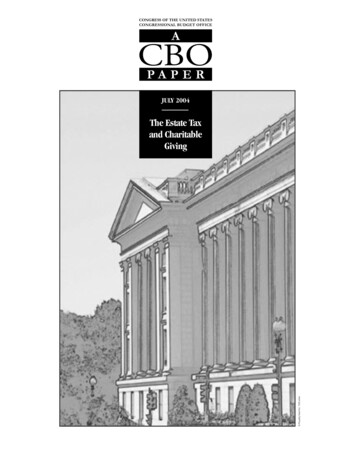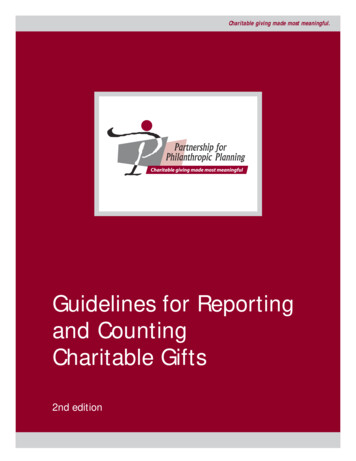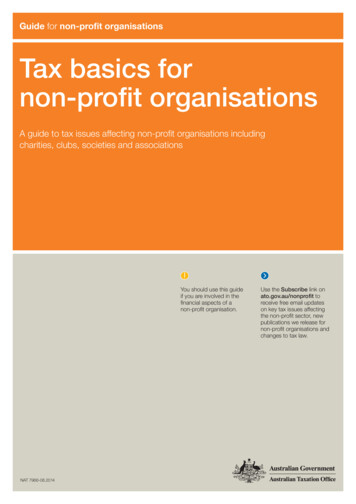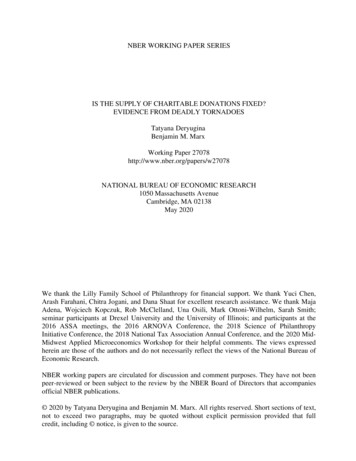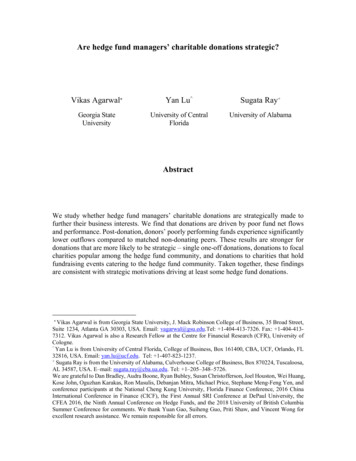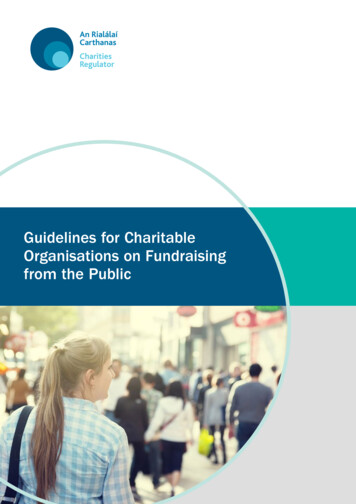
Transcription
Guidelines for CharitableOrganisations on Fundraisingfrom the Public
iiGuidelines for Charitable Organisations on Fundraising from the PublicThese Guidelines are issuedby the Charities Regulatorpursuant to section 14(1)(i) of the Charities Act 2009,to encourage and facilitatethe better administration andmanagement of charitableorganisations (charities).CHARITIES REGULATOR
CHARITIES REGULATORGuidelines for Charitable Organisations on Fundraising from the PublicAbout the CharitiesRegulatorThe Charities Regulator was established in October 2014 as Ireland’s statutoryindependent authority for the regulation and protection of charitable trusts andorganisations (charities). Under the Charities Act 2009, the Charities Regulator’sgeneral functions are to:increase public trust and confidence in the management and administration ofcharitable trusts and charitable organisations;promote compliance by charity trustees with their duties in the control andmanagement of charitable trusts and charitable organisations;promote the effective use of the property of charitable trusts or charitableorganisations;ensure the accountability of charitable organisations to donors and beneficiaries ofcharitable gifts, and the public;promote understanding of the requirement that charitable purposes confer a publicbenefit;establish and maintain a register of charitable organisations;ensure and monitor compliance by charitable organisations with this Act;carry out investigations in accordance with this Act;encourage and facilitate the better administration and management of charitableorganisations by the provision of information or advice, including in particular by wayof issuing (or, as it considers appropriate, approving) guidelines, codes of conduct, andmodel constitutional documents;carry on such activities or publish such information (including statistical information)concerning charitable organisations and charitable trusts as it considers appropriate;provide information (including statistical information) or advice, or make proposals, tothe Minister on matters relating to the functions of the Regulator.1
2Guidelines for Charitable Organisations on Fundraising from the PublicCHARITIES REGULATOROurMission is:To regulate the charity sectorin the public interest so as toensure compliance with the lawand support best practice in thegovernance, management andadministration of charities.Our Vision is:A vibrant trusted charity sectorthat is valued for the publicbenefit it provides.
CHARITIES REGULATOR3Guidelines for Charitable Organisations on Fundraising from the PublicOur Values are:PROPORTIONALITYOPENNESSWe take an open and transparentapproach to our work. We makeinformation available about howwe operate and about the sectorwe regulate.We recognise the diversity of size andcapacity among the organisations which weregulate. We regulate in a proportionateway and target the resources available tous at areas of greatest risk.LEARNINGOURVALUESFAIRNESSWe operate fairlyand impartially. Weapply our proceduresconsistently andgive reasons for ouractions and decisions.Our actions anddecisions areinformed by evidenceand embedded in alearning culture. Wecontinually seek waysto improve how we doour work and striveto be authoritative inour field.ENGAGEMENTINDEPENDENCEWe take decisions independently andin the public interest. We stand overour actions and decisions and takeresponsibility for them.We communicate with andlisten to our stakeholders.We seek to anticipate andaddress regulatory issues ofconcern to them.
4Guidelines for Charitable Organisations on Fundraising from the PublicCHARITIES REGULATORContentsSection 1Background and Introduction5Section 2Who should read these Guidelines?6Section 3Principles7Section 4Donors and Donations8Section 5Responsibilities of Charity Trustees10Section 6Responsibilities of Management11Section 7Responsibilities of Fundraisers12Section 8Data Protection13Section 9Financial Transparency & Accountability15Section 10Monitoring16AppendixUseful Reference Points17
CHARITIES REGULATOR1Guidelines for Charitable Organisations on Fundraising from the PublicBackground andIntroductionFundraising from the public is an essential and valuablesource of revenue for many charities.However, it is critical that charities carry out all fundraising from the public inan open, transparent, honest, respectful and accountable manner. Fundraisingshould always be underpinned by an appropriate legal framework. Fundraisingactivities which operate on the basis of perceived loopholes in the law riskdamaging the reputation of the charity and the sector more generally.The basis for these Guidelines is the 2008 Statement of Guiding Principleson Charitable Fundraising. These Guidelines have benefitted from the inputof a Consultative Panel on Charitable Fundraising which was set up by theCharities Regulator in 2016 at the request of the Minister for Justice andEquality. They have also been informed by evidence-based research and apublic consultation which took place in Autumn 2016.The Charities Regulator expects that any charities that fundraise will doso in a way which protects the reputations of their charity and encouragespublic trust and confidence in their charity and in charities more generally.This includes following the law and recognised standards, protecting thecharity from undue risk and showing respect for beneficiaries, donors and thepublic. These Guidelines are intended to assist trustees of a charity to runthe charity effectively, avoid difficulties in respect of fundraising activities andcomply with their legal duties.Charities vary in terms of their size and activities. Trustees should considerand decide how best to apply these Guidelines to their charity’s particularcircumstances. The Charities Regulator requires the trustees of eachregistered Irish charity to be able to explain and justify their approach tofundraising from the public, particularly if they decide not to follow goodpractice as set out in these Guidelines.5
62Guidelines for Charitable Organisations on Fundraising from the PublicCHARITIES REGULATORWho should readthese Guidelines?Charity trustees have overall responsibility and accountability for theircharity and this includes fundraising activities of the charity.They have a key role to play in setting theircharity’s approach to raising funds andensuring that it is implemented in practice.The Charities Regulator recognises thecommitment required of trustees andthe challenges they can face in gettingfundraising right. These Guidelines aredevised to support them in dischargingtheir responsibilities. They should be readin conjunction with our Guidelines on dutiesof charity trustees and internal financialcontrols.Trustees shouldensure that allkey people withintheir charitywho are involvedin fundraisingimplement theapproaches andpractices set out inthese Guidelines.These Guidelines apply to all types offundraising from the public for the benefit ofcharities and their beneficiaries. It applieswhether or not:fundraising from the public is a small ormajor part of the charity’s approach toraising money, or;fundraising is carried out by the charity,by a subsidiary trading company onbehalf of the charity, by another personor organisation on the charity’s behalf orby a person or organisation who uses thecharity’s name in advertising.Trustees should ensure that all key peoplewithin their charity who are involved infundraising implement the approaches andpractices set out in these Guidelines. Theseinclude senior management, staff, companydirectors, volunteers and any professionalfundraisers.Donors, potential donors and members ofthe public can also use the Guidelines toensure they are educated and informedprior to making a donation.‘Must’ and ‘should’: what we meanIn these Guidelines ‘must’ means that something is a legal or regulatory requirement or a duty thattrustees must comply with, and‘should’ means that something is good practice and the Charities Regulator expectstrustees to follow and implement it within their charity.
CHARITIES REGULATOR3Guidelines for Charitable Organisations on Fundraising from the Public7PrinciplesUnder the Charities Act 2009, it is a function of the CharitiesRegulator to ensure the accountability of each charity to itsdonors, beneficiaries and the public.To this end, the charity trustees should ensure that their charity has a Donor’sCharter, which should include the commitments set out below and shouldbe publicly available. The charity may expand on these commitments inaccordance with its mission and purpose as appropriate.RespectAll fundraising will respectthe rights and dignity ofdonors, beneficiaries and thepublic.Fundraising activities will notbe unreasonably persistent,intrusive or place unduepressure on people todonate. Should someone notwish to donate, or wish tocease making a donation,that decision will berespected.Beneficiaries will not bepresented in a disrespectfulway in promotional activitiesand, where possible andappropriate, clients andbeneficiaries will have aninput into the promotionalstrategies of the charity.Honesty andIntegrityFundraising will occur in anhonest and truthful manner.Fundraisers will act withintegrity and not misrepresentthe charity, its need for fundsor how they will be applied.Questions about fundraisingactivities and fundraisingcosts will be answeredhonestly and in a timelymanner.Information about thecharity’s charitable purposeand activities will be madefreely available.Charitable donations and giftswill be used for the purposesfor which they were donated.Transparency andAccountabilityThe charity will takeresponsibility for its actions andwill be capable of explaining,clarifying and justifying thoseactions.The charity’s trustees andmanagement will explain andaccount to donors and the publicfor the charity’s actions.The charity will operate in anopen, frank and honest way andwill ensure that transactions,operations, information andcommunications are easilyunderstood by donors and thepublic alike.The charity will clearly identify todonors and the public the causefor which the fundraising isoccurring and how donations willand are being used.The charity will provide wayswhereby those interested caneasily contact the charity.The charity will have a procedurein place to address complaints.
84Guidelines for Charitable Organisations on Fundraising from the PublicCHARITIES REGULATORDonors and DonationsIn addition to the core principles detailed in section 3, the trustees of a charityshould ensure that appropriate policies, procedures and safeguards in respect ofthe matters set out below are implemented by the charity in all of its dealingswith donors.DonorsDonationsTrustees of a charity should make sure thatthe charity takes all reasonable steps totreat donors fairly, enabling donors to makeinformed decisions about any donations. Thisincludes taking into account the needs ofany potential donor who may be vulnerableor who, due to his or her circumstances, mayrequire additional care and support to makean informed decision.Trustees of a charity must ensure that:Trustees of a charity should ensure that thecharity and their fundraisers do not exploitthe credulity, lack of knowledge, apparentneed for care and support or vulnerablecircumstances of any donor at any point intime. If there are reasonable grounds forbelieving that an individual lacks capacityto make an informed decision to donate, adonation should not be taken. A donationgiven by someone who lacked capacity at thetime of donating should be returned.Trustees should ensure that:the charity accurately describes thepurpose of any fundraising;donations received are used to further thecharity’s charitable purpose;where donations are made for a specificpurpose, the donor’s request is honoured.fundraisers carry clearly visibleidentification, which includes the nameof the individual who is fundraising, thecharity’s name, logo, contact details andRegistered Irish Charity Number, alsoknown as an “RCN”;donors are informed of the status andauthority of those soliciting charitabledonations on behalf of the charity so thatdonors are aware whether fundraisers areemployees of the charity, third party agentsor volunteers;where the charity invites the public todonate to a specific cause, that the charityhas a plan in place for handling anyshortfall or excess and is able to informdonors about this;where all of the proceeds of an event arenot going to the cause/charity this shouldbe made clear to donors;if it is not intended that collected itemssuch as clothing or other articles be sentdirectly to the clients or beneficiaries of thecharity but, for example, are to be sold orrecycled instead, this should be made clearto donors.
CHARITIES REGULATORGuidelines for Charitable Organisations on Fundraising from the PublicThird party fundraisersTrustees should be assured that anydonations sought indirectly, such as throughthird party agents, are solicited and receivedin full conformity with the law, the charity’sown fundraising policies and procedures andthese Guidelines.Fundraising by third party agents should bethe subject of a written contract. Trusteesshould ensure the contract is clear andspecific as to the cost of the fundraising,including the percentage of each charitabledonation that will go to the charitablepurpose.Donors have a right to expect that their giftis being used primarily for the charitablepurpose. A charity must not enter into anyagreement which is intended to deliver moreprivate benefit to third party fundraisers thanit does to the charity.Volunteer fundraisersTrustees should ensure that the charity hasa policy for any activities involving volunteers,including how they are contracted andmanaged.1Complaints and feedback procedureTrustees should ensure the charity has clear,transparent procedures in place to enableinterested parties to notify the charity of theircomplaints, questions or comments. Theseprocedures should include systems to ensurethat all complaints are responded to andaddressed promptly, within a specified timeframe.19Public or donor complaints should, in thefirst instance, be addressed by the charity ina prompt manner. Where the charity’s initialresponse does not satisfy the complainant,the charity should provide clear informationabout the next level of the complaintsprocedure, as applicable.If an individual is not satisfied with themanner in which their complaint is handled bythe charity concerned, they should be advisedof their right to raise a concern with theCharities Regulator.Where, in the course of examining any matter,information comes into the possession of acharity trustee or any other person who hasbeen duly appointed to carry out any of thefunctions of a charity trustee, that causesthe person to form the opinion that thereare reasonable grounds for believing thatan offence under the Criminal Justice (Theftand Fraud Offences) Act 2001 has been or isbeing committed, the person must notify theCharities Regulator in writing.Legal obligationsCharities must be mindful of all relevant legalrequirements and conform fully to these,including - but not limited to - obligationsunder charity, labour, equality, and dataprotection law.Donors have aright to expectthat their giftis being usedprimarily forthe charitablepurpose.A useful resource in this regard is the Citizens Information Board publication Managing Volunteers: A Good PracticeGuide, available on their website ions/voluntary sector.html
105Guidelines for Charitable Organisations on Fundraising from the PublicCHARITIES REGULATORResponsibilities ofCharity TrusteesThe ultimate responsibility for adherence to these Guidelines rests with thetrustees of each charity.The trustees are accountable to the beneficiaries, donors, funders and the public. Fundraisingexists only to support the overall mission and charitable purpose of a charity. However,breach of trust in this area can lead to significant damage to the reputation of the charity andcharities more generally.Trustees are therefore responsible forensuring that their charity fulfils itscommitment to best practice in fundraising.Where, as often happens, trustees decideto delegate the day-to-day management offundraising to employees or third parties,there should be effective systems in placeto ensure that:1.any delegation is clearly documented(for example in staff job descriptions,volunteers’ role descriptions andcommittees’ terms of reference),understood and implemented;2.there are checks that the delegatedauthority is exercised properly;3.clear reporting procedures are in place,which include guidance on any particularmatters that are to be reported to thetrustees;4.trustees receive regular and fullydocumented reports on agreed matters,presented in a way that they canunderstand and use and which allowsthem to exercise proper oversight;5.management and staff implement andadhere to the Guidelines and fundraisingis handled in a transparent, effective andefficient manner, in line with an agreedplan;6.procedures are in place to enable donors,potential donors and the public to notifythe charity of their questions, commentsor complaints related to fundraising andsystems are in place to ensure that allfeedback, in particular any complaint,is responded to and addressed within aspecified time frame, and;7.fundraising strategy and operations arereviewed and audited on a regular basis.
CHARITIES REGULATOR6Guidelines for Charitable Organisations on Fundraising from the Public11Responsibilities ofManagementCharity trustees may delegate certain responsibilities to management, including theresponsibility for organising or managing fundraising campaigns.Those responsible for organising and managingfundraising campaigns and activities have arange of responsibilities in order to meet thecommitment to donors.The charity’s Donor’s Charter should becommunicated to all fundraisers, whethervoluntary, paid or third party agents.Where events are organised in the charity’sname but are not known to the charity untilafter the fact, the charity should work withthe fundraiser concerned to ensure that thefundraiser is aware of the standards expectedso that the fundraiser can ensure any futureevents held meet those standards.Where management hasresponsibility for fundraisingby a charity, they should ensure thefollowing:1.2.3.Fundraisers, suppliers and contractors areinformed about and contracted to adhereto the Guidelines in their fundraising workfor the charity; all paid fundraisers haveappropriate contracts, including a clauseconfirming compliance with the Guidelinesand relevant legal requirements relating tofundraising;Where fundraisers are paid, payments arenot excessive and are not likely to resultin undue pressure being put on the publicto donate and that the charity is informedas to whether payments to fundraisersare related to the performance of thefundraiser;Appropriate training and support is inplace to enable fundraisers to effectivelycarry out their role in an open, honest andrespectful manner and in compliance withapplicable legal requirements;4.So far as is reasonably practicable,fundraisers are not exposed to risks totheir health and safety;5.Checks are in place relating to thesuitability and credentials of fundraisers toraise funds on behalf of the charity;6.Fundraisers are aware of and can generallycommunicate the charitable purpose ofthe charity and of the specific fundraisingefforts in which they are involved;7.Fundraisers are aware that they shoulddisclose if they are employees of thecharity or third party agents;8.Fundraisers provide clear and adequatewritten or verbal information to donorsand the public regarding the nature andtype of follow up contact that they canexpect from the charity, such as telephonecalls, texts and the frequency of plannedcommunications;9.There is not misleading or ambiguousinformation in any of the charity’sfundraising communications;10. Procedures are implemented andsafeguards are in place to ensure that,to the fullest extent possible, particularcaution is exercised when soliciting frompeople who may be considered vulnerable,including from minors;11. All public collections have a Garda permit,or where no permit is required, permissionfrom the relevant local or other authority(such as for collections in church grounds).
127Guidelines for Charitable Organisations on Fundraising from the PublicCHARITIES REGULATORResponsibilitiesof FundraisersEach charity should ensure that their fundraisers (voluntary, paid or third partyagents) when engaging in fundraising activities on behalf of the charity arerespectful, honest, transparent and comply with all applicable legal requirements.It must be made clear at all times whetherfundraising activities are for the charity ingeneral or for a specific purpose. Charitiesmust ensure that fundraising materialsdo not imply that money fundraised is fora restricted purpose (such as assistinga particular person or animal) when itmay be used for different purposes or forgeneral funds.Fundraising activities should not becarried out in a manner which constitutesan unreasonable intrusion on a person’sprivacy, is unreasonably persistent orplaces a person under undue pressure todonate.Any information obtained in confidence aspart of the fundraising process must notbe disclosed without express, informedprior consent of the donor.All fundraisers should:1.be trustworthy and conduct themselves at all times withintegrity and honesty and should act openly and in such amanner as to ensure that donors are not misled;2.ensure that their actions enhance the charitable purposeand reputation of the charity that they represent;3.disclose if they are employees of the charity or third partyagents;4.be able to state the purpose for which funds beingcollected will be used;5.have a general knowledge about the aims and objectivesof the charity and be able to inform donors of where theycan find supplementary information;6.not knowingly or recklessly disseminate false ormisleading information in the course of their professionalduties, nor permit others to do so;7.not unreasonably intrude on the privacy of those fromwhom donations are being solicited;8.not make unreasonably persistent approaches nor exertundue pressure on people to make donations to thecharity concerned;9.not act in a manner inconsistent with these Guidelines, orcause or permit others to do so;10. not exploit any relationship with a donor, volunteer oremployee for personal benefit or misuse their position forpersonal gain, and;11. comply with all legal requirements which relate to theiractivities and advocate adherence to these within theorganisation which employs them or for which theyvolunteer.
CHARITIES REGULATOR8Guidelines for Charitable Organisations on Fundraising from the PublicData ProtectionA charity must follow appropriate procedures when handling and processingpersonal data from individuals.All personal data must be collected fairly andlawfully and information which can be identifiedor attributed to one or more individuals mustbe treated as confidential.A charity must comply with all legalrequirements with regard to data protectionlegislation. The Charities Regulator alsoexpects charities to conform to relevantguidance issued by the Data ProtectionCommissioner, in particular, the Data Protectionin the Charity and Voluntary Sector Guidelines2as well as guidance relating to direct andinter-active marketing, including direct mail,email, telemarketing, digital and social mediamarketing, SMS text etc. A charity shouldrespect donors’ stated preferences regardingcontact by the charity and should make it easyto communicate these preferences.Where a third party firm or agent is employedby a charity to fundraise, the public have aright to reasonably assume that any data theyprovide is held only by the charity and not bythe third party.2A charity mustcomply with alllegal requirementswith regard todata protectionlegislation.Data Protection in the Charity & Voluntary Sector Guidelines (March 2014) ch14%201.pdf13
14Guidelines for Charitable Organisations on Fundraising from the PublicAll relevant information must be collected andstored in line with the Guidelines issued by theOffice of the Data Protection Commissioner whichinclude the following:1.Information must be fairly collected and alldonors must be provided with adequate noticeof how their personal data will be processed;2.If a charity has information about people andwishes to use it for a new purpose, the charityis obliged to give an option to individualsto indicate whether or not they wish theirinformation to be used for the new purpose;3.Only the minimum necessary personal datashould be sought by charities;4.The retention of donor PPSNs, other than inrelation to donations where tax relief remainsrelevant, is a breach of the Data Protection Acts1988 & 2003;5.Charities should implement a comprehensiveretention policy for all records containingthe personal data of donors, beneficiaries,registered campaigners etc;6.All marketing preferences should be accuratelyrecorded and respected;7.Every charity should have a security policy andset of procedures which explicitly address thesecurity aspects of any personal data beingcollected, transferred or held by the charity orany personal data disclosed to third parties andensure that appropriate security measures arein place;8.All charities should ensure that donors,clients, service users and employees areclearly informed of their rights under the DataProtection Acts to gain access to a copy of theirpersonal data;9.Every charity should draw up a Data ProtectionPrivacy Policy and a separate Data ProtectionStatement for its website.More information on the responsibilities ofcharities as data controllers is available on thewebsite of the Data Protection Commissioner atwww.dataprotection.ie.CHARITIES REGULATORGeneral Data Protection RegulationThe General Data Protection Regulation, commonlyreferred to as the “GDPR”, which will strengthenthe rights of individuals in Europe, will come intoforce on 25 May 2018.The GDPR will introduce significant changes inthe area of data protection law by increasing theobligations and responsibilities of organisationsin relation to how they collect, use and protectpersonal data. Many of the new requirements areof particular relevance to charities in the context offundraising, where personal data may be collectedfrom donors as part of such activities.Key requirements of the GDPR include therequirement for organisations such as charitiesto be fully transparent about how they use andsafeguard personal data and that organisations beable to demonstrate accountability for their dataprocessing activities.Charity trustees should ensure that theyunderstand and are prepared for the new rules inthis area.Information on the GDPR and the main changesthat it will introduce for individualsand organisations is available on the DataProtection Commissioner’s microsite:www.gdprandyou.ie
CHARITIES REGULATOR9Guidelines for Charitable Organisations on Fundraising from the Public15Financial Transparencyand AccountabilityFinancial accountability goes to the heart of transparency and is particularly importantin the context of fundraising by charities.Financial controls3.At the earliest possible date, cash bankedand income summaries should be reconciled.Where practical, this should be undertakenby a person independent of the counting andcashing up of the money;4.Records must be made of donations forspecific purposes (to certain appeals orprojects) to ensure that the terms of donationsare complied with. Charities must ensure thataccepted donations are used to support thepurposes in accordance with the conditionsattached to the donation;5.Where a charity is in receipt of funds restrictedto certain purposes or projects and wherethe charity cannot realistically apply the fundswithin a reasonable timeframe to that purposeor project, the charity, in consultation withthe Charities Regulator, must allocate thosefunds to a purpose as close as possible tothe original intended purpose. Where practical,this change should be communicated to thespecific donor(s);6.All funds should be used reasonably andprudently in the interest of the charity. Thisinvolves ensuring that remuneration offundraisers is proportionate to the benefitreasonably expected to be obtained. Paymentsto fundraisers must not be excessive;7.Charities should make it clear to all volunteersthat anyone raising money must ensure thatthe charity receives all that money. Volunteersshould have only their out-of-pocket expensesreimbursed, on the basis of receipts provided;8.Charities should implement a culture of zerotolerance to theft or fraud and any suspicionsrelating to such matters should be immediatelyraised by the charity with An Garda Síochána.Trustees must ensure the following:The charity keeps proper books of account,which correctly record and explain transactions;Internal financial control procedures are in placeto ensure that funds are used effectively and tominimise the risk of funds being misused;The charity reports annually to the CharitiesRegulator.Charities should be in a position to provide a fullfinancial account of each individual fundraisingevent. This includes the gross amount of fundsraised, the associated fundraising costs and towhich charitable purpose or charitable fund theproceeds of the event have been allocated.The Charities Regulator has published separateGuidelines on Internal Financial Controlsfor charities (available on our website). TheGuidelines give practical guidance in relation tothe main areas of financial control for charities:income; expenditure; banking (including paymentsand loans); assets and investments andmonitoring arrangements. They contain a numberof useful checklists for chari
Charitable donations and gifts will be used for the purposes for which they were donated. 3 Under the Charities Act 2009, it is a function of the Charities Regulator to ensure the accountability of each charity to its donors, beneficiaries and the public.

